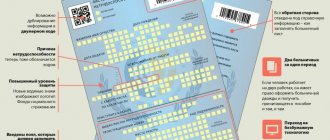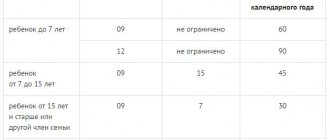How to calculate sick leave for child care Sick leave for caring for minors
A working parent (guardian, custodian, other relative) can receive a paid certificate of incapacity for work if a child becomes ill or injured. Information on how long sick leave can last in different situations is contained in Order of the Ministry of Health and Social Development dated June 29, 2011 No. 624n, and payment rules are contained in Federal Law dated December 29, 2006 No. 255-FZ.
Let us remind you that the amount of temporary disability benefits is calculated from the average salary for the last 2 years and the total length of service. Employees with less than 5 years of experience are paid a benefit in the amount of 60% of earnings. 80% - those with 5 to 8 years of experience. Those with more than 8 years of experience will receive 100% of their earnings.
How to apply correctly?
The procedure for applying for leave to care for a sick relative depends on its type:
at your own expense or paid.
In both cases, the procedure is extremely simple: in the first, the employee only needs to submit an application for leave at his own expense in the name of the employer, and in the second, provide him with a sick leave certificate received at a medical institution.
Payment for a business trip on a day off - this can be achieved by knowing a number of legal subtleties. Falsifying sick leave is a criminal offense. Follow the link for more information. How to get maternity benefits for your husband? Read more about this in our article!
In what cases is sick leave issued to care for a sick child?
A working parent caring for a child under 7 years of age has the right to paid sick leave for up to 60 days a year. If the sheet is issued for a period of more than 60 days in total, then the parent is not fired, since the reason for absence from work is valid, but leave to care for a sick child in excess of 60 days in total per year is not paid.
If the child is from 7 to 15 years old, then paid leave is issued at a time only for 15 days; repeated paid care leave can be issued again for up to 15 days, but in total - no more than 45 days a year.
Sick leave for caring for a child under 15 years of age is issued for both inpatient and outpatient treatment, that is, for treatment at home with visits to medical institutions.
If a child is disabled, has cancer or HIV, such a patient can be cared for for a longer period of time.
Is a certificate of incapacity required for caring for a seriously ill person?
Let's consider whether sick leave is given in case of caring for a relative. If a loved one is sick and needs to be cared for, then a certificate of incapacity for work is issued. It is issued if a sick relative is undergoing outpatient treatment and needs supervision. The following factors influence its issuance:
- Failure to properly care for a patient can lead to death or serious deterioration in health.
- The presence of indications that prevent the possibility of sending the patient to hospital for inpatient treatment.
- Among relatives, no one else has an objective opportunity to care for the patient.
When there are disabled relatives in a family, situations often arise where more careful and close care for them is required. In this case, you can receive a certificate of incapacity for work:
- for a disabled child under 15 years of age – this is 120 days a year;
- for adults – standard, 30 days a year.
If there is a need to look after disabled adults, the duration of sick leave for care cannot exceed 7 days. So, you can take sick leave and extend it at the end of the period , but the company is unlikely to pay for it beyond the norm, and even more so the Social Insurance Fund (SIF) will not pay for it.
If treatment takes place in a hospital, then sick leave for care is not issued. In a hospital setting, the patient is cared for by qualified medical professionals. The only exception is provided for mothers and sick leave is possible provided that the child’s age is less than 15 years and she is in the hospital with him.
When caring for relatives suffering from cancer, sick leave is also issued. The duration of sick leave does not depend on the severity of the disease.
If a loved one has undergone surgery, they will not be kicked out of the hospital. He will be treated in hospital until his condition is satisfactory. A certificate of incapacity for work is not required.
If relatives wish to be present and help the patient, then only on their own initiative and without providing a certificate of incapacity for work. If, after inpatient treatment, close care is required during outpatient monitoring, then a certificate of incapacity for work can be issued to a relative of the patient.
Seriously ill, bedridden relatives, who may be in this condition for quite a long time, require careful and close care. In this case, sick leave is issued, but its terms are also regulated by law. still have to take leave without pay or hire a nurse for the duration of your illness .
Pivot table
To understand how long it is allowed to care for a child and for how many days benefits will be paid, we have prepared a table that shows the maximum periods of sick leave depending on the age of the child and the features of payments. Please note: on April 10, a new version of Order of the Ministry of Health No. 624n came into force, and the corresponding amendments are already being taken into account.
| Patient's age | Duration of sick leave | Period of paid absence from work (during the year) |
| Up to 7 years | The entire treatment period | No more than 60 days For diseases from the Order of the Ministry of Health and Social Development dated February 20, 2008 No. 84n - no more than 90 days |
| From 7 to 15 years | 15 days, unless the period is changed by the medical commission | No more than 45 days |
| Over 15 years old | For outpatient treatment - up to 3 days By decision of the medical commission - up to 7 days | No more than 7 days per sheet No more than 30 days |
| Disabled person under 18 years old | The entire period of treatment, regardless of whether it is carried out at home or in a medical organization | No more than 120 days |
| HIV-infected person under 18 years of age | The entire period of joint stay in an inpatient treatment facility | No limits |
| Cancer patient under 18 years old | The entire treatment period | No limits |
Parents, grandparents and guardians should be aware that each of them may require a certificate of incapacity to help a sick child. And the above norms will apply to everyone separately.
But keep in mind that sick leave is not always issued. For example, if a mother is on leave to care for another child or on maternity leave, then she will not be given a certificate of incapacity for work to treat a sick baby. But the attending physician can issue such a document for the father or grandmother.
Conditions for taking this type of vacation
The Labor Code of the Russian Federation provides for 2 types of leave to care for a sick relative: paid and at one’s own expense.
Paid leave implies the issuance of sick leave and the employee receiving monetary compensation.
Registration of a sick leave certificate for caring for a sick relative is possible in cases where care is needed for a child undergoing inpatient or outpatient treatment or for an adult in an inpatient medical facility.
A sick leave for caring for an elderly relative can be issued only for one family member (this can be a guardian or trustee) for a period of up to 3 days. If the medical commission considers it necessary, the period of sick leave can be extended to 7 days.
Parents of a sick child can take turns applying for sick leave; this is not prohibited by law..
It is worth noting that if the duration of the vacation exceeds the limits established by law, then the caregiver’s absence from work is not grounds for his dismissal. In this case, the payment of compensation simply stops and upon returning to work the employee continues to be on the staff of the enterprise.
It is not uncommon for two children to become ill at the same time. In such a situation, sick leave is issued for one child and is extended until the second one has fully recovered.
If while on sick leave to care for a child the caregiver falls ill, the sick leave for care is closed and a temporary certificate of incapacity for work is issued.
Leave without pay is a last resort; its duration is determined by agreement between the employee and the employer. In this case, the employee’s salary is not retained and no compensation payments are made.
Justification for the need for such leave is also not required, therefore no special grounds are provided for it.
Sick leave to care for sick parents and other relatives
You can also receive temporary disability benefits if other family members are unwell - parents (adoptive parents), spouse, brothers or sisters, grandparents, grandchildren. Learn more about who can care for you, with reference to the Family Code.
According to the Family Code of the Russian Federation, any relative can receive sick leave to care for a sick relative. Under Article 2 of the RF IC? relatives are spouses, parents, children, adoptive parents and adopted children and persons bound by rights and obligations arising from marriage, kinship and adoption. That is, family members include grandparents, grandchildren, brothers and sisters, stepfathers, stepmothers, stepdaughters and stepsons (Article 14 of the Family Code of the Russian Federation).
When issuing a certificate of incapacity for work, it indicates the degree of relationship:
- 38 - mother;
- 39 - father;
- 40 - guardian;
- 41 - trustee;
- 42 - another relative caring for a sick relative.
The attending physician can issue a sick leave so that a working citizen can stay at home and care for the patient for a period of 3 to 7 days. If necessary, you will have to take the remaining days at your own expense or as part of your annual leave.
As for the payment of benefits, one certificate of care for an adult patient will be paid for a maximum of 7 days. The maximum duration of the paid period per year is 30 days. But remember, staying at home and caring for a chronically ill person during a period of remission is not prohibited.
Legal restrictions
Caring for sick loved ones is not a right, but a responsibility on a moral and ethical level. How to resolve the issue with the employer if the process requires constant presence with the patient? What is decisive – the degree of relationship or the severity of the disease? Do medical institutions provide sick leave for caring for a cancer patient, a disabled person of group 1, a disabled person of group 2, or sick leave for caring for a sick relative?
When defining the concept of “relative,” the Family Code is based on the rights and obligations arising from marriage, the birth and adoption of children, and the relationship to elderly parents. When issuing a certificate of incapacity for work, the presence or absence of other loved ones who are able to care for them with minimal losses is considered.
Medical staff restrictions
At the legislative level, the circle of persons who can issue sick leave to care for a sick relative is not limited. The determining factor is the need for constant supervision, in the absence of which there is a high probability of a sharp deterioration in health, including death. The decision to issue a certificate or refuse is made by the attending physician.
However, not every doctor, regardless of qualifications, has the right to issue certificates of incapacity for work.
Documents are not issued:
- workers of medical institutions in the absence of licenses of the appropriate type;
- emergency physicians;
- health workers of sanatoriums and dispensaries;
- medical specialists from health centers.
- Violation of the sick leave regime and its consequences
When going to a health center, calling an ambulance, or deteriorating health status while undergoing sanatorium-resort treatment, a document confirming a medical examination is a certificate. On its basis, a medical institution that has the appropriate license, if necessary, issues sick leave to care for a family member. The date of commencement of care for a sick adult or child is considered to be the date indicated in the certificate.
Restrictions in the presence of several grounds
Refusal to issue a certificate is imposed by Article 40 of the Order of the Ministry of Health and Social Development of the Russian Federation No. 624n as amended on November 28, 2017, according to which a BC is not issued if:
- on paid annual and additional leave;
- on maternity leave;
- on unpaid leave (at your own expense);
- on parental leave until the age of three;
- a patient with a chronic form of the disease in a period of remission (stable improvement);
- in a hospital setting, if the patient’s age exceeds 15 years.
The general approach to refusing to issue a certificate of incapacity for work during inpatient treatment is based on the provision of care by medical staff, and being on all types of leave does not require presence at the workplace and allows unhindered care for the patient around the clock.
If the insured person has several reasons for receiving a certificate of disability (for example, his own illness and the need to care for a seriously ill relative), then only one of the employee’s choice is subject to payment.
Is it possible to take turns caring?
The Federal Social Insurance Fund of the Russian Federation, in Letter No. 02-09-14/15 dated July 28, 2016, clarified the possibility of issuing sick leave for child care alternately to different family members (see paragraph 36 of the procedure for issuing certificates of incapacity for work, approved by Order of the Ministry of Health and Social Development dated June 29, 2011 No. 624n).
Each family member is issued a certificate of incapacity for work as a primary one, since the insured event is not the illness of a family member, but the temporary disability of the insured person due to the need to care for a sick relative. In this case, a sick leave issued to another family member who previously cared for the patient must be closed. Sick leave is also issued only if there is still a need to care for a sick relative. The insurer recommends that each person caring for a patient pay 100% of the benefit corresponding to the length of the insured person’s work experience for the first 10 calendar days, and in subsequent days - 50% of average earnings.
So, if a mother has exhausted all days of sick leave due for payment, she can transfer the care of a sick child to the father or to a working grandfather, grandmother, aunt, sister or other relative.
Legislation
Leave to care for a sick relative is issued in cases where it is necessary
caring for a child, both in an inpatient and outpatient setting, or for an adult receiving treatment in an inpatient facility.
The legislation of the Russian Federation does not contain any requirements regarding the degree of relationship, that is, the caring relative can be a child, a brother, a nephew, etc.
Only those citizens for whom insurance contributions are received into the state budget or those who make these contributions independently can take out sick leave to care for a sick relative.
Registration of benefits is possible not only for citizens of the Russian Federation, but also for foreign nationals, as well as stateless persons.
Cash compensation for leave to care for a sick relative is provided to certain categories of citizens:
- employees engaged in professional activities on the basis of an employment contract concluded with the employer;
- lawyers, notaries, individual entrepreneurs engaged in private practice;
- civil servants working on the basis of a contract;
- other categories of citizens, subject to their regular payment of insurance premiums.
The order of the Ministry of Health and Social Development of the Russian Federation determines the maximum permissible scope of leave to care for sick relatives. This order does not contain any classification regarding the age of the sick relative (not counting children), i.e. sick leave can be issued to care for a relative either 20 or 80 years old.
Features of caring for disabled parents
We recommend
“How to change diapers for adults: rules for caring for bedridden patients” More
Caring for disabled parents involves several basic measures to improve the quality of their existence, regardless of the caregiver’s family ties:
- sanitary and hygienic procedures;
- purchasing necessary medications, issuing them to the patient and checking that medications are taken;
- purchasing food and other necessary things;
- cooking food;
- feeding, if necessary;
- cleaning the premises where a disabled person lives and solving other everyday problems;
- carrying out the necessary procedures that do not require medical education, measuring blood pressure or temperature;
- following all doctor's instructions.
There are three groups of disabilities, differing in the degree of loss of ability to work and the ability to care for oneself:
- I - assigned to people with complete loss of ability to work, when a person needs constant care and assistance. The patient cannot walk independently and does not orient himself in time and space. The patient cannot control his behavior and communicate with other people.
- II - this group is assigned when the ability to serve oneself is partially lost. A person can perform simple manipulations and move around with the help of special devices. The patient cannot work at all, or can work partially and needs special conditions, special organization of the workplace or outside help. A person cannot undergo training at all or can obtain knowledge in specialized institutions, under a simplified program or through home study. Orientation in space and time and control of behavior are satisfactory only with outside help. Communication with other people is possible only with the support of others or medical devices.
- III - disabled people of the third group can care for themselves, but need additional devices. A person moves without assistance, but slowly and over short distances. The patient can study, but subject to a special regime and the help of others (not teachers). Disabled people of the third group cannot hold positions in their specialty, but cope well with less responsible tasks and a light workload. They can communicate with other people, but with difficulty. Such people learn, absorb and transmit information, but to a lesser extent.
Recommended articles on this topic:
- Features of older people: psychological and physiological
- The main problems of older people and ways to solve them
- Boarding home for the elderly: features and rules of choice
Sample sick leave certificate
The disability form is a document of strict accountability, which is assigned a personal individual number during production. There are also specific requirements for filling out the form.
In particular, the following rules must be observed:
- Only the attending physician can enter information into the document;
- filling is carried out in block letters with a black ballpoint pen;
- corrections, erasures and crossing-outs are not allowed;
- all titles and proper names must be written in full, without abbreviations;
- Given the need to maintain medical confidentiality, many fields are filled out using universal codes.
If the issued document is damaged or lost, the citizen can receive a new form (duplicate) instead.
What documents are needed for sick leave?
First of all, it is necessary to understand that a certificate of incapacity for work is issued by the attending doctor on the day the patient applies and the reasons for additional care are identified. Therefore, in order for an employed citizen to receive a form, he must come to the hospital together with a sick relative. Or, when calling a doctor to your home, you must be with a relative in order to confirm that they are being looked after.
You should have a passport of a Russian citizen with you, which will confirm the identity of the temporary guardian. Further, the extension of the form is carried out without presenting any documents. But in order to pick up the form to present it at work, you must also provide a civil passport.
All sick leaves are subject to strict reporting and are issued against signature. From the moment of termination of treatment, a period of six months begins to count, during which the citizen is obliged to transfer the received document to the employer. Otherwise, days of incapacity for work will not be paid.
The employer will only require a sick leave certificate; no additional paperwork is needed. Considering that only the first three days are paid by the company, and the remaining period is compensated by the Social Insurance Fund, the accounting department of the enterprise (where the citizen works) independently prepares a package of related documents and sends them to the Social Insurance Fund.
When do they have the right to refuse?
If an employee has sick leave to care for a relative, he has the right to miss work days and calmly treat his parents, grandparents, and children. Sick leave is not issued without a reason; the illness must be significant, but in a number of cases the document is refused :
- if the employee is on paid leave;
- parents on maternity leave;
- for chronic diseases in remission;
- pensioners;
- minors;
- if the patient can take care of himself.
The employer does not have the right to refuse payment if the patient and the employee live in different apartments.
Calculation and payment
Payment of compensation occurs within the next month from the date the document is submitted to the employer (usually together with wages). It is important to submit the certificate no later than 6 months from the date of its issuance, otherwise it will not be considered valid. If there is a good reason, you can extend the period through the court.
When an employee has several jobs, a sheet is issued for each employer. In this case, there should be a mark which is the main job and which is part-time.
Attention! If an employee has been working in a company for less than two years, he needs to take a certificate of income from his previous place of work. This is necessary for the correct calculation of compensation.
The amount of payment depends on length of service . If a person has been contributing to the Social Insurance Fund for more than 8 years, he will be given a 100% salary reimbursement for missed days. From 5 to 8 years only 80% is calculated. If you work officially for less than 5 years, you can only count on 60% of the minimum wage.
The accountant calculates the average income of an employee for two calendar years, while contributions to the insurance fund were made from his salary. The result must be divided by 730. This is the number of days over two years, which gives the average income per day. The amount is multiplied by the percentage of length of service. The result is payment of compensation for one day of sick leave.
Reference! If less than one month has passed since the employee was dismissed, the company still pays him sick leave.
For the disabled, elderly and seriously ill
Caring for disabled people has its own characteristics, since it involves providing not temporary, but permanent help and support to loved ones. Especially if the first group is assigned or there are significant health problems. An employee of a medical institution is allowed to issue sick leave to care for a disabled minor child for all days of treatment, regardless of its type. Only 120 days (per year, based on the average) for shared hospital stay are subject to payment at the expense of the Social Insurance Fund; 100% for the first ten days and 50 percent for all subsequent days - for outpatient treatment.
A certificate for caring for an adult disabled person is issued for no more than seven days and is issued only when on an outpatient basis near the patient. Often this time is not enough and carers employed under an employment contract are forced to take unpaid leave or quit their jobs altogether. Further, receiving benefits is possible only by contacting the social protection authorities and after providing the necessary package of documents.
Reflection of the fact confirming the provision of assistance to elderly and seriously ill adult relatives outside the hospital on the certificate of incapacity for work is also limited: for each case - up to seven days and no more than 30 per year.
Other subtleties of the issue
There are certain factors that may make it possible to refuse to issue sick leave when caring for a relative. These include the following:
- if the relative’s illness (from 15 to 80 years old) is not chronic and does not go away in a severe form;
- if the person who requires a sick leave certificate is on a planned vacation (although by law this point can be challenged in certain cases);
- if the patient is under administrative arrest;
- if a patient over the age of 15 is treated in a hospital where he is cared for by medical workers;
- if the lack of care cannot provoke a significant deterioration in the patient’s condition;
- if there are other relatives who are able to provide care and care for the person.
In most cases, an employee has the legal right to issue sick leave when caring for a sick relative, be it a minor child or an adult. Depending on the age of the patient and the severity of his illness, the period for which a certificate of incapacity for work can be issued is limited.
Caring for sick children: features
Depending on what age category the child belongs to, the limits on the provision and payment of sick leave for his care are different. Thus, children from 15 to 18 years of age are treated like adults, and the form is issued for a period of no more than seven calendar days (outpatient treatment).
Advice! If a child becomes ill from birth to seven years of age, a certificate of incapacity for work is issued for the entire period of treatment. This occurs regardless of the order of care (hospital or home). If a child between seven and 15 years old falls ill, the period is reduced to 14 days for each case of illness, for outpatient or inpatient treatment.
How does payment work?
The employer is obliged to pay for the period of care for a relative with a disability. The main condition is that the employee must provide a paper or electronic sick leave certificate, drawn up in accordance with all the rules.
All days spent caring for a sick relative are paid from the social insurance fund. The calculation is made as follows:
- The first 10 days of the care period are paid on a general basis, based on the average earnings of a particular employee and his length of service. If it exceeds 8 years, then payment is made in the amount of 100% of the received calculation. If the experience is between 5 and 8 years, then the person will receive 80% of the calculated value. If the experience is less than 5 years, then 60% of the indicator obtained in the calculation is subject to payment.
- Subsequent days in the amount of 50% of the average earnings for the days the relative was ill, regardless of length of service.
Expert commentary
Kamensky Yuri
Lawyer
In order to receive benefits for caring for a sick relative with “disabled” status, you need to bring the sick leave certificate to the accounting department within six months from the calendar date of its closure. The benefit will be accrued within 10 days after the document is transferred to the responsible employee. The money will be paid on the next payday.
The procedure for calculating benefits is as follows:
- Determine the total “labor” income of a particular employee for the last 2 calendar years that preceded the occurrence of the insured event. Benefits for vacation, illness or care, and forced downtime are deducted from the calculation.
- Calculate the exact number of calendar days that the applicant has worked over the past 2 years. Vacation days, illnesses, and others are excluded from the calculation.
- Calculation of average earnings for 1 calendar day. This is done by dividing the total amount of income by the number of days worked by the employee.
- Comparison of the obtained value with the maximum and minimum values. If the result obtained is below the “minimum”, then the minimum indicator is accepted. If it is greater than the “maximum”, then the maximum indicator is accepted.
- The resulting value now needs to be multiplied by the exact number of days that the employee spent caring for his sick relative.
The employee can always find out the amount to be received from the pay slip. The employer is obliged to issue it.
Procedure for issuing a certificate of incapacity for work
If you need to receive sick leave when caring for a sick family member, you will need to take the following steps:
- Direct contact with the patient at the clinic. A similar case would be an independent visit to a hospital for treatment in a hospital or a call to an ambulance, whose doctors transport the patient to a medical facility.
- Providing identification documents of a person who is going to care for a patient for some time and who needs to take out sick leave to confirm the validity of absence from work. This can be an internal passport of a citizen of the Russian Federation or a document confirming registration on the territory of the Russian Federation (if the person is not a citizen of our country).
- Providing documentary information about family ties with the patient. This may be a birth or adoption certificate of a child, a marriage certificate, a birth certificate of the person applying for sick leave (if care is provided for one of the parents). In some cases, when issuing certificates of incapacity for work, doctors are content with only verbal assurance that the patient and the person providing assistance to him are relatives.
- Registration of the sick leave itself. The employee filling it out will make a special note - indicate the code of the relationship between the patient and the employee filing the sick leave.
- Providing a certificate of incapacity for work at the place of work (either directly to the boss or to the human resources department).
- Checking the correctness of the document and sending it to the accounting department to calculate payment for the period of absence.
In some cases, an employee may need additional documents - certificates of disability of the patient, extracts from medical commissions, etc.










